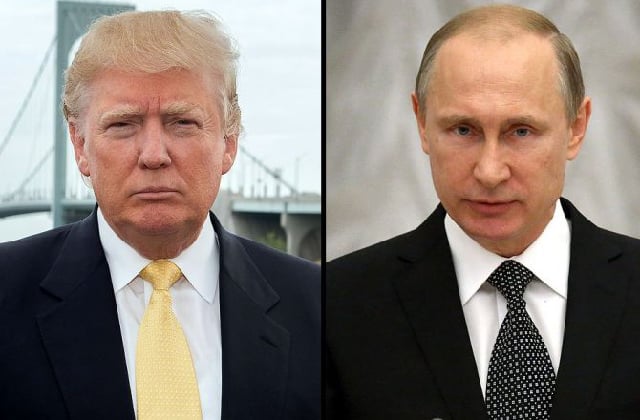38 percent of Americans consider Trump’s relationship with Russian President Vladimir Putin is “too friendly”: Politico

President Donald Trump insists questions about once-hidden contacts between his inner campaign circle and Russian officials are a “witch hunt.” Public-opinion polls suggest Americans don’t agree, reports Politico.
While the public still has considerable confusion about what, precisely, individuals connected to the Russian government did — and how they might have been connected to the Trump campaign — there is general consensus that whatever happened, it merits further independent investigation.
Over the past few months, public opinion on Russia — its involvement in the election and possible connection to Trump — has begun to solidify. And while much of that hardening falls along partisan lines, there are hints that sentiment is tilting against the president.
The public, by and large, doesn’t think Trump has done anything illegal. But they are less-than-comfortable with Trump’s coziness with Russia, and they want to know more about it.
An NBC News/Wall Street Journal poll released this week asked Americans if they believe that Trump’s relationship with Russian President Vladimir Putin is “too friendly” or not. A 38 percent plurality called the Trump-Putin relationship too friendly, more than the 29 percent who said it wasn’t too friendly. Nearly a third, 32 percent, didn’t have an opinion.
When it comes to the Trump-Russia issue, there are two parallel trends that should raise red flags for the White House. First, as Americans have formed opinions on the issue, it has been to Trump’s detriment. Since December, the percentage of undecided Americans on the Trump-Putin relationship has declined from 44 percent to 32 percent. At the same time, the percentage who view Trump as too friendly with the Russian leader has risen from 31 percent to 38 percent.
Moreover, while nearly two-thirds of Democrats feel Trump is too friendly with Putin, only half (52 percent) of Republicans feel he isn’t too friendly with his Russian counterpart. Independents are unsure about Trump’s relationship with Putin — but more feel they are too friendly (35 percent) than think they aren’t (27 percent).
That fits a general pattern: As last year’s presidential campaign developed — and Putin’s regime apparently worked to undermine Democrat Hillary Clinton — some Republicans warmed to the former KGB operative. A Gallup survey last month showed the percentage of self-identified Republicans who had a favorable opinion of Putin rose 20 points from 2015 to 2017. And significantly more Republicans had a favorable opinion of Russia (35 percent) than did Democrats (16 percent).
It’s worth noting that another February poll, from Quinnipiac University, did not show nearly the same levels of support among Republicans for Putin. But Quinnipiac did ask voters if they think Trump views Putin favorably — and the vast majority, 70 percent, said he does.
Voters were split along partisan lines, however, on the issue’s significance. Overall, just under half of voters, 47 percent, said alleged Russian involvement in the election is “very important,” while a further 18 percent said it is “somewhat important.” Nine-in-10 Democratic voters called it either very or somewhat important, but only 35 percent of Republicans agreed. Among independents, 63 percent agree it is very or somewhat important.
Forty percent of Republicans said it isn’t important at all.
More broadly, the Trump administration’s relationship with Russia doesn’t rate among the public’s most important issues facing the country. The Russia issue didn’t even register in Gallup’s tracking of the most important problem facing the U.S. last month.
Still, multiple surveys show widespread support for new and continued investigations into Trump’s connections with Russia, despite the president’s assertions that the controversy is contrived by the media to obscure the much-reported fact that Trump won last year’s election.
In the NBC News/Wall Street Journal poll, majorities think the Congress should investigate both whether or not there was contact between Russian officials and individuals in Trump’s campaign (53 percent) and whether the Russian government interfered with the election (54 percent).
The Quinnipiac poll omitted any reference of Congress and asked voters if they “support or oppose investigations into the potential links” between Trump advisers and the Russian government. Those probes earned even more backing: 72 percent of voters support those investigations, and only 23 percent oppose them. Even 52 percent of Republicans support investigations into the Trump campaign’s contact with Russian officials.
But voters remain hesitant to accuse Trump of direct wrongdoing. Just 20 percent of voters in a McClatchy-Marist poll last month said they thought Trump has done something illegal in his dealings with Putin and Russia, while another 28 percent said they thought Trump has done something unethical but not illegal.
On the other side, 41 percent of voters said they didn’t think Trump has done anything wrong, and 10 percent were undecided. Democratic voters are skeptical of Trump — but they aren’t convinced he has acted criminally. Just a third said he’s done something illegal, while another 44 percent thought he’s done something unethical.
And Republicans — in control of both chambers of Congress and weighing how strenuously to investigate and potentially rebuke Trump’s administration — will take note of this figure: The vast majority of GOP voters, 82 percent, didn’t think Trump has done anything wrong. Only 2 percent of Republicans thought Trump has acted illegally, and 7 percent thought he’s acted unethically.

























